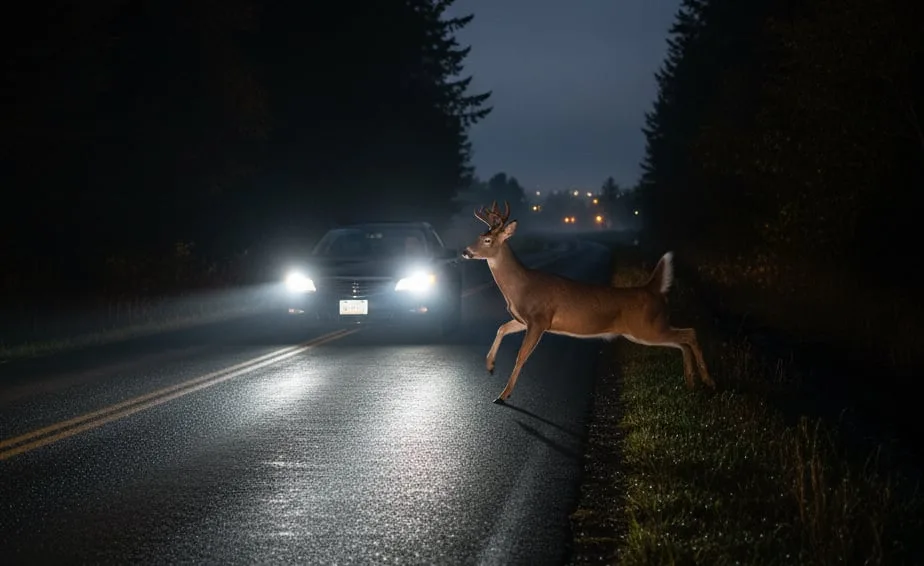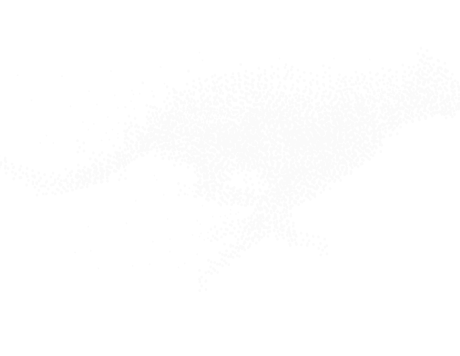You’re driving home after sunset, headlights cutting through the dark, when suddenly—a deer darts into the road. You hit the brakes, but there’s no time. The impact is jarring, your vehicle is damaged, and you’re shaken.
Deer collisions and other animal accidents are far more common than most drivers realize, especially in rural areas and along highways near wooded regions. According to the Federal Highway Administration, over one million wildlife-related crashes occur in the U.S. every year. These collisions result in thousands of injuries, millions in property damage, and tragically, even fatalities.
If you’ve recently had a collision with a deer or another wild animal, you may be asking:
Who pays for the damage? Does insurance cover it—or are you on your own?
At Gould Injury Law, our car accident attorneys help drivers understand their insurance coverage, navigate the claims process, and recover fast after unexpected crashes. Here’s what you need to know when wildlife causes your crash.
Call 888-WIN-FAST for a free consultation and get back on the road quickly.

Deer Collisions in Connecticut: A Growing Risk
Each fall, Connecticut drivers face increased danger from deer crossings—especially during dawn and dusk when deer are most active.
Highway areas surrounded by woods, farmland, or open fields are considered high-risk areas for wildlife collisions. The combination of high speeds, reduced visibility, and large animals suddenly entering the roadway often leads to serious accidents.
While animal crossing signs warn drivers, many collisions happen too fast to avoid. A driver swerves, hits another car, or collides head-on with oncoming traffic. Even a direct impact can cause significant damage, depending on the size of the animal and speed at impact.
What Type of Insurance Covers Animal Collisions?
When wildlife causes your crash, the type of auto insurance coverage you have determines whether your repair costs and injuries are covered.
1. Comprehensive Coverage: The Key to Animal Collisions
Comprehensive insurance—sometimes called “other-than-collision” coverage—is what typically pays for damage caused by wild animals.
If you hit a deer, moose, or another animal, your comprehensive insurance pays for the vehicle damage (minus your deductible).
Comprehensive coverage usually applies when:
- A deer collision occurs on a rural road.
- You hit a wild animal such as a raccoon, coyote, or turkey.
- Your vehicle damage results from animal involvement, not another car.
Comprehensive also covers non-collision incidents, such as theft, vandalism, fire, or falling objects.
However, comprehensive insurance is not legally required in Connecticut—it’s an optional add-on to your auto insurance policy. Without it, you may have to pay out of pocket.
2. Collision Coverage: When You Hit Another Vehicle or Object
If your accident doesn’t involve direct contact with an animal—say, you swerved to avoid hitting a deer and crashed into a guardrail or tree—collision coverage applies instead.
This type of insurance coverage helps pay for:
- Repair costs to your vehicle
- Damage from hitting another car or stationary object
- Accidents caused by evasive maneuvers
However, collision insurance only covers damage to your own car—it won’t pay for injuries to others or property damage caused by other drivers.
3. Liability Coverage: Protecting Other Drivers, Not You
Liability coverage is the minimum insurance coverage required by Connecticut law. It pays for bodily injuries or property damage you cause to other drivers.
But if you collide with a deer or another wild animal, liability coverage won’t help you. Since the accident wasn’t your fault and didn’t involve another vehicle, liability insurance provides no payout for your own damage.
Does Insurance Cover Injuries From an Animal Collision?
If you were injured in a deer collision, your insurance company may help pay medical bills—but only under certain coverages.
- Personal Injury Protection (PIP) or MedPay:
These optional add-ons cover medical expenses and bodily injuries for you and your passengers, no matter who was at fault. - Comprehensive and Collision Insurance:
While these cover vehicle damage, they do not cover medical bills.
If you have health insurance, it will usually cover injuries sustained in the accident after your deductible is met.
Who Pays When a Domestic Animal Causes the Accident?
When a domestic animal—like a dog, cow, or horse—wanders into the road and causes a car accident, the situation changes.
In these cases, the animal’s owner could be legally responsible if they failed to keep their pet or livestock properly contained. Under Connecticut’s strict liability laws, pet owners must ensure their animals do not create hazards on public roads.
If a domestic animal caused your crash:
- Get a police report documenting the incident.
- Contact animal control to identify the owner.
- File an insurance claim under your collision coverage while your lawyer pursues compensation from the owner’s insurance.
Our attorneys can help determine whether local laws or negligence make another party financially accountable.
The Claims Process After a Deer Collision
Filing an insurance claim for a collision with a deer follows a few essential steps:
Step 1: Notify Authorities
Always notify authorities after the crash. Police can file a report, remove the animal from the roadway, and help direct traffic if needed. This official record is vital for your claim.
Step 2: Document the Scene
Take photos of:
- The vehicle damage
- Skid marks or debris
- The animal involved (if possible)
- The surrounding environment and animal crossing signs
Visual evidence supports your claim and helps your insurance company verify that a wild animal caused the crash.
Step 3: Contact Your Insurance Provider
Call your insurance company as soon as possible to report the accident. Provide the police report number, your photos, and other documentation.
Step 4: Get a Repair Estimate
Your insurer will likely ask you to visit a certified shop or adjuster to assess repair costs.
If you have both comprehensive and collision coverage, your insurance pays depending on how the crash happened:
- Direct animal collision = comprehensive coverage
- Crash while avoiding an animal = collision coverage
Step 5: File a Personal Injury Claim (If Needed)
If you suffered bodily injuries, you may need to file a personal injury claim under your PIP, MedPay, or health insurance plan to cover medical bills. Our personal injury attorneys can help you through every step of the process.
What if Insurance Denies the Claim?
Sometimes insurance companies deny animal collision claims—especially if they suspect a driver was speeding, distracted, or failed to take reasonable precautions.
In these situations, you need an experienced advocate. The attorneys at Gould Injury Law can:
- Review your insurance policy and coverage options
- Challenge wrongful claim denials
- Gather evidence showing you weren’t negligent
- Negotiate with insurers for fair compensation
- File a lawsuit, if necessary, to recover your losses
We work quickly to help clients secure results—because the longer a claim drags on, the harder recovery becomes.
Preventing Wildlife Collisions: Safety Tips
While some wild animal crashes are unavoidable, you can take steps to significantly reduce your risk:
- Slow down in rural areas, especially at night.
- Use high beams (when safe) to spot animals early.
- Watch for animal crossing signs, they mark high-risk zones.
- Brake firmly, but don’t swerve into oncoming traffic.
- Keep a greater distance between vehicles.
- If you see one deer, expect more, deer travel in groups.
- Always remain calm and focused while driving.
Even safe driving practices can’t eliminate the danger entirely, but staying alert and defensive behind the wheel helps protect everyone on the road.
Legal Responsibility in Unique Circumstances
Certain unique challenges can complicate animal accidents, including:
- Government liability if poor roadway lighting or missing signage contributed
- Private property owners failing to install fencing where deer frequently cross
- Municipal neglect in removing carcasses that caused secondary collisions
In these cases, your attorney may investigate whether another entity was legally responsible for your crash.
Why You Need Legal Help After an Animal Collision
Even if no one else is directly at fault, insurance disputes can delay your recovery.
Having an experienced personal injury attorney ensures your rights are protected from start to finish.
At Gould Injury Law, we help clients:
- Review auto insurance policies for coverage gaps
- File complete and accurate insurance claims
- Prove that the wildlife collision was unavoidable
- Recover fast payouts for vehicle damage and medical expenses
- Hold negligent property owners or drivers accountable, if applicable
We understand that after a crash, every day counts—that’s why we’re known as the “Fast Firm.”
Contact Gould Injury Law for a Free Consultation
If you’ve been injured or suffered vehicle damage after hitting a deer or another wild animal, you don’t have to handle the insurance process alone. Our attorneys act fast to help you secure compensation and peace of mind.
Call 888-WIN-FAST or contact us online today for a free consultation.
At Gould Injury Law, we fight for fair compensation and faster results—because when life hits hard, we help you recover faster.
